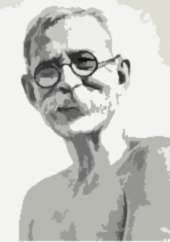Sarat Chandra Pandit
Sarat Chandra Pandit (27 April 1879 – 27 April 1968),[1][2] better known as ‘Dada Thakur’ (দাদাঠাকুর), was a well-known composer of humorous rhymes, writer, publisher and social critic. He had his ancestral house at Dafarpur[3] in Jangipur Sub-division of West Bengal, India. Most of his life he resided at Jangipur town.
Sarat Chandra Pandit | |
|---|---|
 Dadathakur sometime in the 1950s | |
| Born | 27 April 1879 Simladdi, Birbhum district, Bengal Presidency, British India |
| Died | 27 April 1968 (aged 87) Jangipur, Murshidabad, West Bengal, India |
| Occupation | columnist, satirist, humorist, poet, social critic, lyricist |
| Nationality | Indian |
| Genre | humour, poetry, satire, social criticism |
He singly-handedly published the newspaper, 'Jungipore Sangbad' playing the roles of author, press-compositor, proof-reader and printer. Initially he was assisted by his wife and temporary workers in running the press, a wooden hand-press which was run in his bedroom. He also published 'Bidushak' [বিদূষক] (Jester), a pamphlet of satire, humor and social commentary and used it as his weapon for social change and to bring public awareness against corruption.
He was known for his ability to memorise, ability to compose at will rhymes and songs full of puns and wit.[4] Sarat Chandra Chatterjee gave him the name 'Bidushak Sarat Chandra' in recognition of his very popular humorous compositions. His keen knowledge of both the Bengali, Hindi and English languages made him a unique composer of multilingual rhymes and witticisms. He created much Bengali Palindrome.[5] The local British administrators also became aware of him and his criticism.
The Bengali film Dada Thakur (1962) was made in his lifetime commemorating his life, with Chhabi Biswas playing the titular role of Dadathakur.
References
- "History of Murshidabad". Archived from the original on 4 February 2012. Retrieved 8 March 2012.
- "Obituary: Sarat Chandra Pandit". The Indian Express. 28 April 1968. p. 7. Retrieved 16 February 2018.
- "Dafarpur". Retrieved 8 March 2012.
- "Rebellion in times of caution, The Telegraph, Kolkata". Retrieved 8 March 2012.
- Ramkrishna Bhattacharya (2015). Chapar Ghanto (Bengali). Kolkata: Sristisukh Prakashan. p. 79.